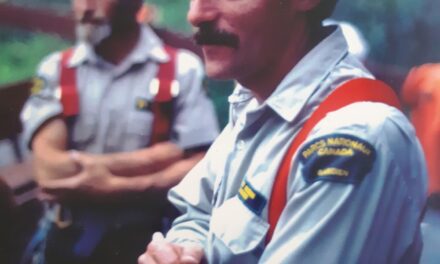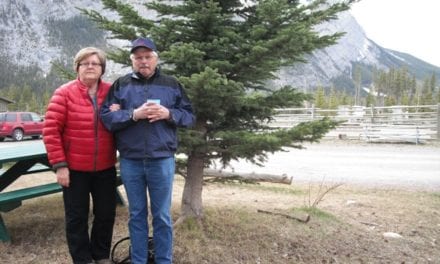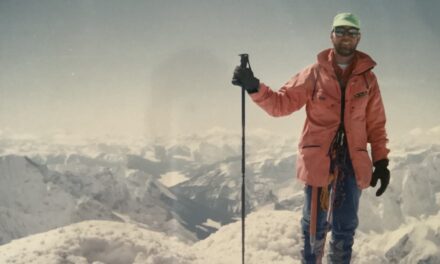(0:45:14) That was an interesting time. The father of this young guy (who had been mauled) was a used car salesman out of Edmonton. He was pretty upset and that was understandable. I would have been too if my kid had got chewed up or somebody I knew. I was upset anyway and he wasn’t related to me. But his father was pretty hysterical about it all when he did come… and I could tell (by) dealing with him that he was going to try and sue somebody. So anyway in a few months, why we had a lawsuit against us. They sued me as the area manager and the supervisor of the place for negligence and my Chief Warden who was Mickey McGuire and Bruce Mitchell who was the Superintendent and the Queen. We all got sued. Our names were all on the thing. Because there wasn’t any precedent, nobody had been sued over a grizzly bear at that time…so they were quite a while getting anything done. But they did eventually have an investigation for discovery and they, the bureaucrats did a poor job of it because they should have sent my Chief Warden to that investigation for discovery, but they didn’t. They sent a bureaucrat. Of course he had no experience and of course they made a mess of it. But that is the way they do things. The lawyer that I had at that time, he became a judge and had given me another good lawyer from Edmonton. He is a prince of a guy. I see him occasionally yet. He is a real nice man and a real sharp guy. I was so lucky because…when you go to court with these government lawyers most of them can’t defend a traffic ticket, let alone deal with something like that. But he was an excellent guy and he had an excellent helper. We went through that. Eight and a half years after the thing we were in court. It took that long. Mickey McGuire had retired and died. Bruce Mitchell had retired and he was in the hospital in Victoria and Stan Kitchen has died. The father of the young fellow who had instigated the law suit had died. So when we got to court, there was Fred and myself and he was a good guy. Fred was a real decent young man. Nobody deserved what happened to him. He had no animosity against me. He gave me full credit for saving his life. He even came and saw me. I had been to see him in the hospital. He was in the hospital in Edmonton for probably six months…His attorneys and his father and the rest of them they didn’t want him to come near me, but he did anyway. He was a nice fellow. We were in court for a week and it turned out alright. I told a couple of my Superintendents in later years that I was found competent by a high court judge and that’s more than they could say! I don’t know any other public servant that had been found competent by a high court judge…anyway I have that to brag about!
(0:49:43) That was just one of the many (stories). There were lots of interesting things that we were involved in. Lots of search and rescue and lots of drowning and things, lots of bear incidents. I found it difficult to protect grizzly bears when I had a negligence lawsuit against me for all those years.
(0:50:06) (In response to the question, “How did you meet your wife, Cathy?”) Cathy was from Stony Plain country. She had a lady friend at Jasper that ran a place at Pocahontas which is down near the east gate (of Jasper National Park). Her brother had a water well business and he was out there and drilled a well for these people. Then they always needed extra staff at holidays and weekends and stuff. She had come out there and worked for this lady…I had met her there because these people were friends of mine. Then she went to work in the bank in Stony Plain and then she transferred to the bank in Jasper. I used to kid her about coming and looking to see who the available young bachelors were that had a bank account! That’s how that all happened!
(0:51:16) One of the things I was going to tell you about that fire at Willow Creek and this guy coming with a helicopter. You know we only had that helicopter for that one afternoon because I got those people on it and I got some horses and packed water up there…I was working on that fire for four or five days there with those guys. It was an isolated fire and it was in a high spot, difficult…But anyway when the Alberta Forest Service phoned Mickey McGuire told him that they had a fire up there in the north end of Jasper, that they had contacted me and had the helicopter there and I had moved some of my trail crew on there. As far as they knew that thing was under control. I didn’t get to talk to him that day or the next day either. But anyway when I finally got to talk to him, I always laugh about it and he did in later years. He went down to the Superintendent and said “You know we got a fire going up in the north end of the park. I don’t know much about it because it is isolated but…I know the warden’s got some men on it and we had this helicopter there yesterday…” Anyways the first thing the Superintendent said was “Who in the hell authorized this helicopter! Who’s going to pay for that?” He was just fit to be tied! That’s a different world. To my knowledge that is the first helicopter that first worked in Jasper on a fire. But just the attitude was…just different!
(0:53:20) Anyway it didn’t amount to anything, it never flared up again. I had two more fires after that…Those big fall lightning storms came right down the east side of the park and along the east boundary. They went right through to Nordegg…sometimes we would get 15 or 20 strikes, not necessarily fires, but we’d get strikes in there when we had the right kind of storm. We had those various fire lookouts in Jasper. We had five and then we shared one with the province. Those guys used to tell me what was going on…We had telephone communication with them first and in later years we had radio communication. But our radios were pretty poor.
(0:54:33) When I was on the Brazeau district for instance, our radios were old wartime radios…sometimes in the wintertime I could talk to Wood Buffalo and the Ya-Ha-Tinda, but I couldn’t talk to Jasper! At Brazeau, at the headquarters, we had the forestry phone, but that was the only one we had. We had…five other cabins where we didn’t have a phone. They would be pretty upset with someone like me if I was down there now in the wintertime because they get real worked up about people being away from the radios.
(0:55:29) I was down there in 2003. My son Craig and I made a trip down the south boundary. We had a two week trip. We started and went around through there and that was the most important thing about the system now, we had to have a radio and check in every night… A little hard for me (with) my background! I was used to being gone up north there with those geological parties for three months…but anyway that is the new world! It is alright the guys that are there now need it.
(0:56:25) From Maligne I moved into town. I went in there and I was looking after the high use areas…Again we had a lot of crisis management…
(0:57:02) I have another funny one that I always tell…when I was in there in that high use area. I was right across the street from the fire hall and the ambulance and Bev (the warden dispatcher)…she came in and said, “Mac can you take an ambulance call?” I said, “I guess so, where am I going?” She said, “I don’t know. They are over there at the fire hall. They are desperate!” So I went over there, it was about 11:30…anyway there was a little guy who had the ambulance parked in front of the door and I said to him “Who’s going with me?” He said, “Got nobody, got nobody!” I said, “Well where am I going?” He said, “To the post office.” Well that’s just right in the next building practically. So I recruited a guy off the street there and said, “Come on with me…I’ve got an ambulance call.” He was a warden that was in town that day, Allen Stendie. He said, “I don’t want to do that.” I said, “To hell with you. You are coming!” So we went over there and I couldn’t park. I had to double park in the middle of the street. We go in there and this poor old guy is dead in the middle of the floor. So anyway we gathered him up and put him in the basket and stuck him in this ambulance and I go to the hospital and they are pouring cement. I couldn’t get in…I had to go around to the front door. So we packed this guy in through the front door…The doctor said to me, “Mac, what did you bring this guy in here for? He’s already dead!” I said, “What do you want me to do doc? Take him to the landfill?” He said, “No, no take him to the morgue!”…That’s what kind of keeps you going, those things!
(0:59:33) I moved into town…February of 1972…I was there until the summer of 1975. In 1975 I went to Pukaskwa which is halfway between Thunder Bay and Sault Ste. Marie, on the north shore of Lake Superior. Then again a new place. A brand new place and they had been open a year or two. Mike Schintz was there about a year or so ahead of me. He stayed there about a year. But they were just kind of trying to get established there in his time. When I came there they did have an office and they had a little bit of staff. The Superintendent moved a week after I got there. I was there from August to January without a Superintendent. I didn’t have anybody in finance either. So it was interesting! A fellow used to come up from Cornwall and spend a week with me every once in a while. At least every second or third week this guy would be up there. He would grab up the correspondence and we would pay the bills and stuff and then he would go back to Cornwall. We were building houses and facilities all the time I was there…just less than three years, I never had anybody in general works. I was the general works manager. I looked after the capital program. I was the Chief Warden and all those kind of things. We did a boundary survey. That park is 725 square miles, so it is a pretty good sized park in Ontario standards. We had to do the boundary survey and that was done by two contractors, but I managed that contract and looked after that and hired the people for them because we had a lot of Indian crews. I had a helicopter by the month and I had a tugboat by the month and a bunch of stuff. We did have some of those all terrain vehicles. It takes a little getting used to doing stuff like that. Where it was different for me was having more money than I could spend. I was never used to having any money! I never had any money at Pacific Rim either, but it was quite an experience to be someplace like that where you got lots of money. (There was money because it was a new park) and because it was in the east. But it was an experience, it was good. We didn’t have any tourists and we had a cooperative fire agreement with the Ontario government. We did have a fairly good sized fire one time, but I didn’t have very much involvement in it other than loan them a lot of equipment because we had quite a bit of equipment. They bought a bunch of equipment because they had money. I had Indian crews and I had seven patrol men who were native people…One of the guys that had been there before I came was Byron Irons. You must have heard of Byron? Because they were trying to get these native guys involved in the park we sent one to the Maritimes and he never came back. He was down there for a while and we sent another one to Point Pelee. We sent two to Riding Mountain. That was part of the program (to) exchange and try to get these guys trained…I sent to one to Georgian Bay and he was a pretty good guy. He was a native fellow and he had been in the occupation army and been overseas and places. He had a drinking problem and they had a nice boat down at Georgian Bay and he got in this boat and got down to the next town and got into the bar…Then he got back into this boat…he was coming up through the tourists in the summertime and blowing the horn, waving and tooting and giving these fisherman the wash! Anyway it was pretty interesting! The Superintendent phoned me up and said, “Mac, you got to take that guy back out of here…” But those are the kind of experiences you get from those kinds of places…It was all interesting, quite educational!



